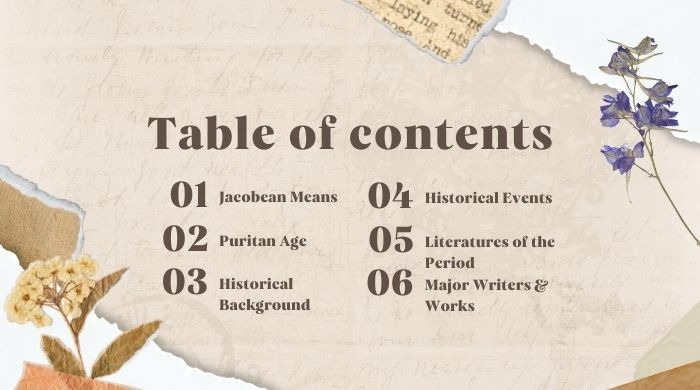রাজা প্রথম জেমসের (James-I) সিংহাসনে আরোহণের সময়কাল থেকে The Jacobean Period in English Literature শুরু। তিনি মুলতঃ স্কটল্যান্ডের রাজা ছিলেন। তখন তিনি James-IV উপাধিতে ভূষিত হতেন। রাণী এলিজাবেথ (Queen Elizabeth) মৃত্যুবরণ করেন ১৬০৩ সালে। তাঁর মৃত্যুর পর এই চতুর্থ জেমস-ই James-I উপাধি ধারণ করে ইংল্যান্ডের সিংহাসনে আরোহণ করেন। এ যুগ সম্পর্কে আলোচনা করতে গিয়ে আমরা নিম্নলিখিত main focus বা আলোচ্যসূচির দিকে নজর দেবো

- The Meaning of the Term “Jacobean” (জেকবীন শব্দের অর্থ)
- What is Puritan Age (পিউরিটান যুগ কি)
- Historical Background of the Age (এযুগের ঐতিহাসিক পটভূমি)
- Some Important Historical Events of the Period (এ যুগের কিছু গুরুত্বপূর্ণ ঐতিহাসিক ঘটনা)
- Literature of the Period (এযুগের সাহিত্য)
- Major Writers and Their Major Works (প্রধান প্রধান লেখক এবং তাঁদের রচনাবলী)।
The Jacobean Period in English Literature
This age is named after James I who reigned England from 1603 to 1625. The word, “Jacobean” is derived from “Jacobus”, the Latin version of James. Visit our YouTube Channel “Sopner BCS“
What is the Puritan Age
Some historians like to call the time span from 1620 to 1660 the Puritan Age. They call it so because in between 1620 and 1660, Puritanism became the driving force in the life and literature of England. Five years of this period also belong to the Puritan Age (1620-1660).
Historical Background of the Jacobean Period
England এবং Scotland একত্রিত হয়ে Great Britain নাম ধারণ করে। James- I মিলিত Great Britain ও আয়ারল্যান্ডের প্রথম রাজা ছিলেন। বহু গুণ থাকা সত্ত্বেও তাঁর শাসনামল ব্যর্থতায় পর্যবসিত হয়। এ জন্য তৎকালীন ফ্রান্সের রাজা মন্তব্য করেন যে, James-1 খ্রিস্টান জগতের শ্রেষ্ঠ পণ্ডিতমূর্খ (The Wisest Fool) ।
তিনি খোদায়ী রাজাধিকারে বিশ্বাসী (The Divine Right of Kings) ছিলেন। তাঁর বিরুদ্ধে Roman Catholic যাজক Watson প্রথম ষড়যন্ত্র করেন। এই ষড়যন্ত্র The Bye Plot নামে পরিচিত। এ সময় আরেকটি ষড়যন্ত্র হয় যা Main Plot পরিচিত। Lady Arabella Stuart এ ষড়যন্ত্রের সাথে জড়িত ছিলে।
সে সময়ে গোঁড়া Catholic হলেন Robert Catesby এ Guy Fuks | এদের নেতৃত্বে ১৬০৫ সালে ক্যাথলিকরা এক অদ্ভত ষড়যন্ত্র করেন। ইতিহাসে এ ষড়যন্ত্র The Gun Powder Plot (বারুদ ষড়যন্ত্র) নামে অভিহিত হয়। তখন “No Bishops; No Kings” নীতিতে বিশ্বাস করতো।
Some Important Historical Events of the Jacobean Period
- Colonial territories were expanded (উপনিবেশীয় রাজ্য প্রসারিত হয়),
- Religious conflict that subsided in the Elizabethan Age, revived in this period (যে ধর্মীয় বিবাদ রাণী এলিজাবেথের সময়ে থেমেছিল তা আবার এ যুগে ভোগে ওঠে),
- Protestants were divided into three sets. They are Anglican, Presbyterian and Puritan (প্রোটেস্ট্যান্টরা তিনটি ধর্মীয় সম্প্রদায়ে বিভক্ত হয়ে যায়। এগুলো হলো এ্যাংলিকান, প্রেসবাইটেরিয়ান এবং পিউরিটান),
- Renaissance’s influence continued (রেনেসাঁর প্রভাব চলতে থাকে),
- Scotland was brought under the rule of the king of England (স্কটল্যান্ড ইংল্যান্ডের রাজার শাসনাধীনে আসে)।
Literature of the Jacobean Period
Elizabethan এবং Jacobean যুগের মধ্যে সত্যকার কোন পার্থক্য নেই। যারা ষোড়শ শতাব্দীতে কবিতা ও নাটক লিখতে শুরু করেছিলেন তারা প্রায় সবাই Jacobean যুগেও সাহিত্য রচনায় লিপ্ত ছিলেন। তবে এই যুগের মধ্যে কোনই পার্থক্য নেই বললে সত্যের অপলাপ হবে। Elizabethan যুগে প্রবল জলোচ্ছ্বাসের মতো যে উন্মাদনা এবং জাতীয় চেতনা জাতির সমস্ত সত্ত্বাকে আচ্ছন্ন করে রেখেছিল সেটা ক্রমশঃ প্রশমিত হয়। এ যুগের সাহিত্যে আছে যৌবনের মাদকতা। কিন্তু Jacobean যুগের সাহিত্যে এসেছে সে জায়গায় প্রশান্তি ও মাধুর্য। কবিতায় এ বিবর্তন স্পষ্টভাবে প্রতিফলিত হয়। নিম্নলিখিত form বা ধরণের সাহিত্য- কর্ম এ সময়ে রচিত হয়-
- Poetry of the Jacobean Period (কবিতা),
- Drama of the Jacobean Period (নাটক) এবং
- Essay of the Jacobean Period (প্রবন্ধ)।
Poetry of the Jacobean Period
Elizabethan কবিতা এবং Jacobean কবিতার মধ্যে সাদৃশ্য ও বৈসাদৃশ্য উভয়ই পরিলক্ষিত হয়। এ যুগের কবিতায় উল্লেখযোগ্য অবদান রেখেছেন John Donne, George Herbert, Ben Jonson, George Wither, William Browne, Phineas Fletcher এবং Giles Fletcher | Metaphysical poetry বা.অধিবিদ্যাত্মক কবিতা এ সময়ের সর্বশ্রেষ্ঠ রচনা। যদিও এ ধরণের কবিতা পরিচিতি ও জনপ্রিয়তা পায় অনেক পরে। কিন্তু John Donne এ জাতীয় কবিতা লিখতে থাকেন Elizabethan Period থেকেই। তাঁকে অনুসরণ করেন George Herbert। এভাবে Metaphysical School of Poets বা মেটাফিজিক্যাল কবি-গোষ্ঠী গড়ে ওঠে। এ দলের দলনেতা অবশ্যই John Donne |
Metaphysical Poetry
Literally, ‘meta’ means ‘beyond’ and ‘physics’ means “physical nature”. So ‘metaphysics’ means “beyond physical nature”. In this sense, metaphysical poetry is a type of poetry which deals with abstract or philosophical subjects.
Metaphysical is a term generally applied to a group of 17th-century poets chiefly Donne, Herbert, Vaughan, Marvell, Carew, Crashaw, Cleveland and Cowley. John Dryden used the word, ‘metaphysical’ first. He wrote, “Donne affects the metaphysics”. His judgement was confirmed by Dr. Samuel Johnson.
Features of Metaphysical Poetry
Metaphysical poetry is a special kind of poem. It is led by John Donne. He is also called the founder of the metaphysical school of poetry. Actually, a metaphysical poem contains some characteristics. The following features are remarkable for metaphysical poetry.
- Abrupt beginning.
- Argumentative presentation of emotion.
- Physical love leads to a spiritual union or religious devotion as a theme.
- The terseness of expression which creates obscurity.
- Use of conceit and wit in profusion.
- Skillful use of colloquial speech instead of Elizabethan lucid diction.
- Display of learning.
- Predominance of fancy rather than imagination.
- Dramatic quality and
- Far-fetched images.
John Donne (1573-1631)
John Donne has written in this period Verse Letters, Epicedes and Obsequies, Epithalamions, The Anniversaries (1611 and 1612), The Divine Poems, Holy Sonnets and Miscellaneous Divine Poems.
The Good Morrow is a perfect illustration of the dramatic and syllogistic structure of his love poems. This is one of Donne’s finest poems. It is a passionate love poem. It is also a poem of contenment. It is an exquisite piece of metaphysical poetry. It is one of those poems which bring out the chief characteristics of Donne as a poet.
The Cannonization is a very good love poem of Donne. In the poem, the poet’s lover wants to be cannonised for the sake of his love.
A Valediction: Forbidding Mourning is an exquisitely beautiful love poem. It is famous for the conceit of compass. It deals with the spiritual love.
The Sun Rising is a rare piece of love poem. The poet-lover feels disturbed when the sun gives light in the morning in the time of their love-making. It deals with physical love. But Go and Catch Falling Star and Twicknam Garden are two cynical poems of the poet. In these poems, the poet has expressed the fickleness of the woman’s sex.
George Herbert (1593-1633)
George Herbert was the disciple of John Donne. He was much influenced by him among the Anglican poets. He was not only a religious poet but also famous for his dexterity as a rhetorician. His biographer calls him “Holy Mr. Herbert”. His poetry is wholly devotional. By virtue of both his piety and the sacred character of his verse, he is regarded as the saint of the metaphysical school of poets. “The piety, the reverence and the holiness are never absent from Herbert”. In this respect, Professor Palmer calls Herbert the first in English poetry who spoke face-to-face with God.
George Herbert was born on April 3, 1593 at Montgomery in Wales of England. He was the fifth son in the family. There were seven brothers and three sisters. Of them, his mother was Magdalen who died in 1627. Herbert was educated at Westminster School and Trinity College. He became a Fellow of Trinity College in 1616. He became Reader in Rhetoric in 1618. In 1624, he had become a Member of Parliament for Montgomery. In 1626, he was ordained as a deacon. His mother died in 1627.
In March 1629, he was married to Jane Danvers, a consin of his friend, the Earl of Danby. In April 1630, he was a priest. He died in 1633. Nicholas Ferrar was his friend who published Herbert’s poems under the title The Temple (1633). He has also written a number of Latin poems. Issac Walton was his biographer.
Easter-Wings, Affliction and The Collar are his remarkable poems. All his poems are based on the religious themes. His lyricism is also unmistakable.
Ben Jonson (1573-1637)
Ben Jonson is famous for his dramas. His comedies written in classical model have made him well-known. He was deeply acquainted with Greek and Latin. He has written some poems in the Jacobean Period. Epigrams, The Forest (1616), and The Underwoods (1640) are his principal poetical works.
বহু কবি জনসনের প্রভাব স্বীকার করেছেন। সে যুগে এদেরকে Tribe of Ben or Sons of Ben (বেনের জাতি অথবা বেনের সন্তান) বলে চিহ্নিত করা হতো ৷ John Donne, George Herbert Ben Jonson অনেকেই এ যুগে কাব্য-কবিতার চর্চা করেছেন। তাঁদের মধ্যে অন্যতম হলেন George Wither, William Browne, Phineas Fletcher এবং Giles Fletcher
Drama of the Jacobean Period (নাটক)
William Shakespeare (1564-1616)
Shakespeare who had started writing in the Elizabethan Period wrote twelve serious plays in this period. The plays are Measure for Measure (1604), Othello (1604), Macbeth (1605), King Lear (1605), Antony and Cleopatra (1606), Coriolanus (1606), Timon of Athens (unfinished-1608), Pericles (in part-1608), Cymbeline (1609), The Winter’s Tale (1610), The Tempest (1611) and Henry VIII (in part- 1613).
Macbeth (ম্যাকবেথ)
Macbeth is one of the greatest tragedies of William Shakespeare. It is one of the four pure tragedies of the author. The other three are Othello, King Lear and Hamlet.
Date of Publication and Composition
Macbeth is written about the year 1606. It is published after King Lear and before Antony and Cleopatra.
(i) Milddleton’s Puritan published in 1607. There is a reference to the ghost of Banguo.
(ii) Marston’s Sophanishba is written in 1607.
(iii) William Warner’s Albion’s England in 1607, the story of Macbeth.
Besides, in 1605 King James visited Oxford and was greeted by three students dressed as weird-sisters. The features of versification, the frequency of rhyme and weak endings, etc. also indicate that Macbeth must have been composed about the year 1606.
Sources of the Play
1. Holinshed’s Chronicles of England, Scotland, and Ireland in 1578. It is the main source of the play.
2. Reginald Scot’s Discourse of Witchcraft in 1584 for supernatural treatment.
3. James’ Essay on Daemonology in 1597.
Characters
Male Characters
Duncan: Duncan is the king of Scotland. He is benevolent দানশীল. He is a cousin to Macbeth. He has two sons, Donalbain and Malcolm. He is brutally killed by Macbeth.
Malcolm: He is the elder son to King Duncan. He is a prospective king. Under his leadership, Macbeth is defeated at last.
Donalbain: He is the younger son to King Duncan. At the outset of the play, we see him. But later on, he is no longer found.
Macbeth: Macbeth is the hero of the play. He is one of King Duncan’s generals in the army. He is the Thane of Cawdor. Later on, he is the king of Scotland. His wife, Lady Macbeth instigates him to kill Duncan. She is called the 4th witch in the play.
Banquo: Banquo is one of the generals of King Duncan’s Army. He is also a friend to Macbeth. But he is also slaughtered by the murderers employed by Macbeth. His only son is Fleance who managed to flee from the spot.
Macduff: Macduff is one of the noblemen of Scotland. He is the husband of Lady Macduff. He has killed Macbeth and severed his head from his body. His wife and his son are brutally killed by Macbeth.
Lenox: He is one of the noblemen of Scotland.
Ross: He is one of the noblemen of Scotland. Menteith: He is one of the noblemen of Scotland. Angus: He is one of the noblemen of Scotland.
Caithness: He is one of the noblemen of Scotland.
Fleance: He is the only son of Banquo. He manages to escape from the hands of the murderers sent by Macbeth.
Siward: Siward is the Earl of Northumberland. He is also the General of the English forces. Young Siward is his son.
Young Siward: He is the son to Siward.
Seyton: He is an officer attending Macbeth.
An English Doctor: He is an English doctor. He treats Lady Macbeth when she is ill.
A Scottish Doctor: He is a Scottish doctor. He treats Lady Macbeth when she is ill.
A Soldier: He attends upon Macbeth.
A Porter: He is a comic figure in the play.
An Old Man: He plays a very minor role in the play.
A Boy: He is the son of Macduff.
Female Characters
Lady Macbeth: She is a striking character in the play. She is the wife of Macbeth. She instigates her husband to kill King Duncan. William Hazlitt wants to call her Fourth Witch.
Lady Macduff: She is the wife of Macduff. She along with her son is brutally killed by the order of Macbeth.
A Gentlewoman: She attends upon Lady Macbeth. She looked after her when the lady was sick.
Hecate: She is the main witch.
Three Witches: The witches are Hecate, Graymalkin and Paddok.
Macbeth: Story in Brief
The Witches tell about Macbeth that he will be the Thane of Cowdor and the king hereafter. Their first prophecy comes true. Macbeth becomes the Thane of Cowdor. He informs this good news to his wife. King Duncan decides to stay one night in the castle of Macbeth. He wants to hail Macbeth. But in that night, Macbeth kills him and becomes the king of Scotland. Malcolm, Donalbain and others fly from the place. Macbeth orders to kill Banquo.
The Witches again tell Macbeth that no earth-born can kill him. Only when the Birnum Wood comes to his palace, he will die. Under the leadership of Malcolm, Macduff and other soldiers march towards Scotland. After a great battle, Macbeth dies like a hero.
The Jacobean period in English literature, spanning the reign of King James I (1603-1625), is a remarkable era marked by both continuity and change. Building upon the foundations laid during the Elizabethan age, Jacobean literature is characterized by a deepening complexity in themes, tone, and style. The period is known for its exploration of darker, more introspective themes, often reflecting the uncertainties and anxieties of the time.
 Sopner BCS Sopner BCS: We fuel your BCS dreams
Sopner BCS Sopner BCS: We fuel your BCS dreams




